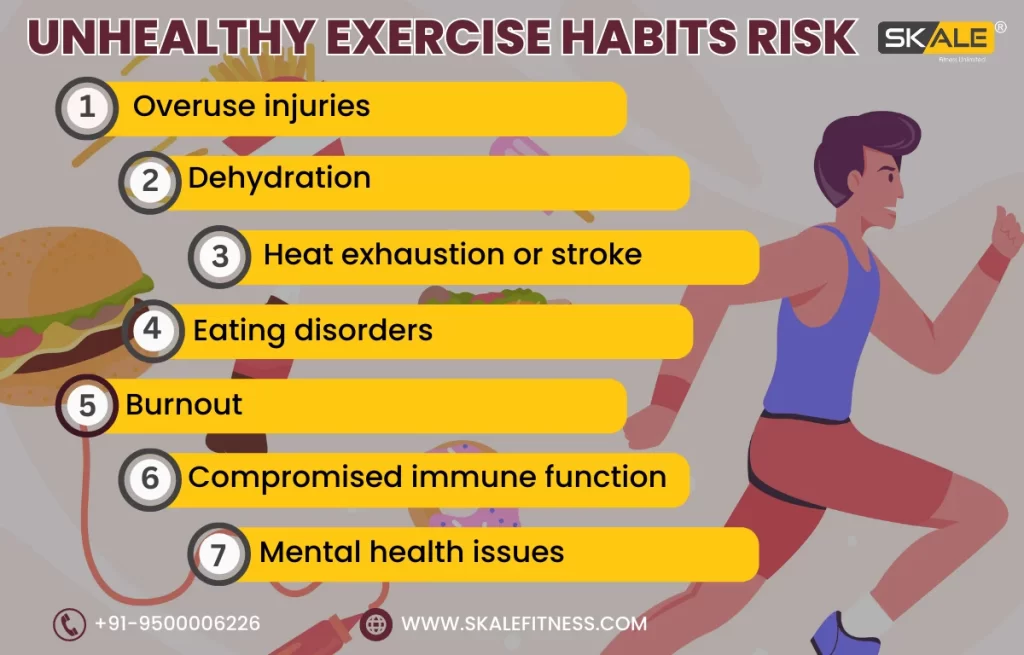Cardio is a popular and effective way to improve cardiovascular health and burn calories. However, many people have a tendency to overdo it, whether it’s running for hours on end or doing the same exercise routine every day.
While cardio is important for overall health, overdoing Unhealthy Exercise Habits can lead to overuse injuries and a lack of progress. It’s crucial to mix up your routine and incorporate strength training to avoid these issues. As we know the saying ‘Health is Wealth’, ensure that while doing exercise, proper routine should be followed in the right way to break out your health issues.

What is Overdoing Cardio?
Overdoing cardio refers to doing too much cardio, either by doing the same exercise every day or by doing excessive amounts of cardio in one session. These unhealthy exercise habits can lead to overuse injuries, such as muscle strains, shin splints, and stress fractures.
To recognize whether you are overdoing cardio, pay attention to your body’s signals. If you’re constantly tired or experience pain, or feel unmotivated, it may be a sign that you’re overdoing it.
How to Mix Up Your Routine?
To mix up your routine, consider incorporating different types of exercises into your routine. This could include strength training exercises like weightlifting or resistance band exercises, or cardio exercises like cycling or swimming. You can also try different types of cardio like high-intensity interval training (HIIT) or steady-state cardio. When incorporating strength training into your routine, start with light weights and gradually increase the weight as you progress.
Why Mixing Up Your Routine is Important?
Incorporating strength training into your routine can help prevent overuse injuries by strengthening the muscles that you use for cardio. Strength training can also improve your overall performance and help you reach your fitness goals more quickly. Additionally, variations in your exercise routine can keep you motivated and prevent boredom. By mixing up your routine, you can also target different muscle groups and avoid overusing the same muscles repeatedly.
What are the Dangers of Overdoing Cardio and How to Overcome it?
Cardiovascular exercise, or cardio, is an important part of a well-rounded exercise routine. However, overdoing cardio can lead to unhealthy exercise habits or negative health consequences such as joint problems, muscle loss, hormonal imbalances, and heart problems. Some of the dangers of overdoing cardio and provide tips on how to overcome it.
Joint Problems
Cardio exercises such as running, jumping, and high-impact aerobics can cause repetitive stress on joints, leading to overuse injuries such as tendinitis and stress fractures. Additionally, cardio machines such as treadmills and ellipticals can also cause joint pain and inflammation. To overcome unhealthy exercise habits, it’s important to incorporate low-impact cardio exercises such as swimming, cycling, and walking. Additionally, practising proper form and using appropriate footwear can help to minimise the risk of joint problems.
Muscle Loss
Overdoing cardio can lead to muscle loss, which can cause a decrease in metabolism and make it harder to lose weight. To overcome unhealthy exercise habits, it’s important to incorporate strength training into your exercise routine. Strength training can help to maintain muscle mass and improve overall body composition. Additionally, including rest days in your exercise routine can help to prevent overtraining and muscle loss.
Hormonal Imbalances
Excessive cardio can lead to hormonal imbalances, particularly in women. Excessive cardio can cause a decrease in oestrogen levels, which can lead to irregular periods, mood swings, and fatigue. To overcome unhealthy exercise habits, it’s important to practise balanced exercise habits that include a variety of exercises such as strength training and stretching. Additionally, maintaining a balanced and healthy diet can help to regulate hormone levels.
Heart Problems
While cardio is great for heart health, overdoing cardio can cause heart problems such as arrhythmias, heart attacks, and strokes. To overcome unhealthy exercise habits, it’s important to monitor your heart rate during exercise and ensure that you’re not exceeding your target heart rate zone. Additionally, including low-impact cardio exercises in your routine can help to reduce the risk of heart problems.
Decreased Immune Function
Excessive cardio can lead to a weakened immune system, making you more susceptible to illness and infection. To overcome unhealthy exercise habits, it’s important to incorporate rest days into your exercise routine and allow your body time to recover. Additionally, practising stress-reducing activities such as meditation and yoga can help to boost immune function.
7 Signs of an Unhealthy Exercise Habit
- Obsession: Constantly thinking about exercise, feeling anxious if a workout is missed, or sacrificing other responsibilities for it.
- Ignoring Pain: Pushing through severe pain during workouts rather than acknowledging and addressing it, which can lead to injury.
- Overtraining: Exercising excessively without proper rest, leading to fatigue, decreased performance, and increased susceptibility to injury and illness.
- Rigid Routine: Inability to adapt or modify workout routines, leading to monotony and potentially overuse injuries.
- Negative Body Image: Exercising excessively due to dissatisfaction with one’s body, using exercise as punishment, or feeling guilty for missing workouts.
- Social Withdrawal: Avoiding social events or engagements to prioritize exercise, leading to isolation and strained relationships.
- Lack of Enjoyment: Exercising solely for the sake of burning calories or achieving a specific physique, without finding joy or satisfaction in the activity.
Conclusion
Overdoing cardio is Unhealthy Exercise Habits can lead to overuse injuries and a lack of progress in your fitness goals. To avoid these issues, it’s crucial to mix up your routine and incorporate strength training. By doing so, you can avoid overuse injuries, improve your overall performance, and reach your fitness goals more quickly.
So, next time you hit the gym, consider adding some strength training to your routine to avoid overdoing cardio.
Also Read: Do You Need a Personal Trainer in a Gym?




